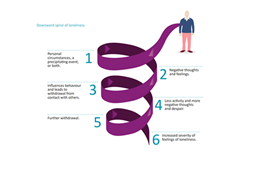How does loneliness affect people?
Loneliness manifests differently in different people and depending on the length and severity of their distress. Below are some of the common ways loneliness ‘shows’ itself. These effects may not be experienced at once; they can occur to different extents and in varying combinations.
Feelings - Loneliness evokes distressing and negative feelings. The words people use to describe their loneliness include: fear, sadness, emptiness, abandoned, lostness, helplessness, not being understood by others.
Psychological effects – Loneliness is an emotional response and it affects how we think and feel. Loneliness can make us anticipate and interpret our social experiences more negatively. This can mean we are more apprehensive or fearful of social situations or pick up on social rejection cues too readily. Loneliness can worsen is if we see the cause of our loneliness as something that will not change: that it is just part of who we are or of becoming older. The negative thinking associated with feeling lonely can become ingrained and make loneliness harder to shift.
Psychological factors are closely linked to social and behavioural factors.
Social and behavioural effects – Understanding the emotions, feelings and thoughts related to loneliness is important because they affect behaviour. Loneliness can lead to a loss of confidence and motivation and influence the way we interact with each other. People may avoid social situations and withdraw from each other. People may take less pride in their appearance and daily routines can become harder to maintain.
This behaviour can in turn set off a downward spiral of more negative thoughts and despair, leading to more intense feelings of loneliness, leading to more prolonged periods of isolation.
Health effects – Chronic loneliness is linked to health risks and early mortality. More information is given in the section below.
Loneliness is a bigger problem than simply an emotional experience. There is increasing evidence that chronic loneliness and social isolation are harmful to both physical and mental health.
- Loneliness increases the likelihood of mortality by 26%.
- Loneliness increases the risk of high blood pressure and is associated with an increased risk coronary heart disease and stroke.
- Loneliness is associated with a greater risk of inactivity, smoking and risk-taking behaviour.
- Social isolation and loneliness are risk factors for the progression of frailty.
- While loneliness is not a mental health issue in itself, mental health problems, particularly depression and social anxiety, can cause loneliness. In the other direction, loneliness can cause mental health problems.
- There is a similar two-way relationship with dementia, where loneliness increases the risk of cognitive decline and dementia, and dementia can lead to people becoming lonely.
- Loneliness increased risk of low self-esteem, reported sleep problems, increased stress response.
- Loneliness and low social interaction are predictive of suicide in older age.

